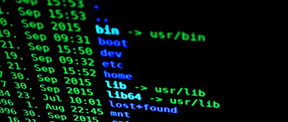**Dive into the Hidden Depths: Exploring the ‘locate’ Command in Linux**
In the vast array of Linux commands, there are some that remain hidden gems, known only to those who venture deep into the terminal. One such command is ‘locate’, a powerful tool that can quickly find files on your system, even when you don’t know their exact location.
**What is ‘locate’?**
Locate is a utility that creates a database of filenames and their locations on the system. This database is updated regularly, ensuring that locate always has the most up-to-date information. To use locate, you simply need to provide a search term, and it will return a list of matching files.
**Why Use ‘locate’?**
While the ‘find’ command is a more comprehensive file search tool, locate is much faster because it utilizes the pre-built database. This makes it ideal for scenarios where you want to quickly find a file without having to wait for a lengthy scan.
**Example Uses:**
* **Find a specific file:** `locate filename`
* **Find files with a particular extension:** `locate *.txt`
* **Find files containing a certain text string:** `locate -i “search term”`
* **Find files in a specific directory:** `locate -r /directory/path`
* **Find files with a certain permission:** `locate -perm +x`
**Additional Features:**
* **Globbing:** Locate supports the use of globbing patterns, such as asterisks (*) and question marks (?) to match multiple files.
* **Regular Expressions:** You can use regular expressions to find files based on complex patterns.
* **Database Updates:** The locate database can be updated manually or automatically using the ‘updatedb’ command.
**Conclusion:**
The ‘locate’ command is an indispensable tool for any Linux user who needs to quickly and efficiently find files on their system. Whether you’re looking for a specific file or want to explore the contents of your directories, locate can help you find what you’re looking for in a matter of seconds. So, next time you’re lost in the labyrinthine depths of your Linux file system, remember the ‘locate’ command and its hidden powers.
